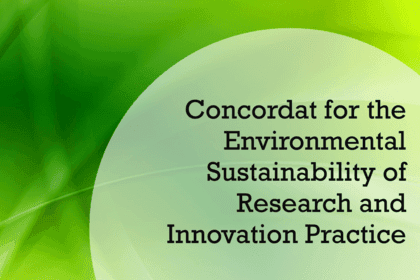
Wellcome sets environmental sustainability standards for researchers, as wider goals to support the UK research sector are launched
New Wellcome policy outlines how researchers must address the environmental impact of their work, coinciding with launch of an environmental sustainability concordat from UK research organisations.
Wellcome will expect researchers to use the most sustainable approaches they can, and to explain in new grant applications how they plan to reduce energy consumption, reuse equipment, and recycle waste products, it was announced today. The requirements are part of a new Wellcome policy that sets out expectations for sustainable research.
Scientific research is at the forefront of finding solutions to the climate crisis and its impacts on our health. Yet all types of research – from lab to computational to field – have an impact on our environment.
To guide researchers and ensure consistency, Wellcome will require those in lab-based environments to achieve the minimum level of accreditation offered by high-quality sustainability schemes such as LEAF and My Green Lab by the end of 2025. Desk, field, clinical, and other researchers will be asked to use tools appropriate to their setting to assess the environmental impact of their work. There are additional expectations for organisations based in high-income countries, such as maintaining logs of existing and left-over resources.
Wellcome will ask new grant applicants to consider the environmental cost of the research approaches in their project as well as the financial cost. This could mean making more environmentally responsible choices, even if there is a higher upfront cost. Existing grant-holders will be able to use existing funds to cover these costs.
Research undertaken with Wellcome funding falls under Wellcome’s scope 3 emissions, which it has committed to reduce as part of a wider sustainability programme to reach net zero. In future, Wellcome will work with researchers and organisations to understand their environmental impact in greater detail in order to get an accurate picture of its scope 3 emissions.
Alyson Fox, Director of Research Funding at Wellcome, said:
“Health research has a crucial role in lessening the impacts of the climate crisis, yet rightly there is an increasing focus on the environmental impact of research itself. The report that Wellcome commissioned through RAND Europe last year highlighted the enthusiasm from across the sector to make change but also the need for meaningful leadership to create the momentum required.
“As an initial signatory of the new environmental sustainability concordat, Wellcome shares the ambition of others in the UK research and innovation sector. Our new policy is a first step but sets a clear path. We look forward to continuing to support world-class science in an environmentally responsible way.”
A report published in August 2023 by RAND Europe and commissioned by Wellcome highlighted the current efforts in place to reducing the environmental impact of health research. It found there are 146 such initiatives in place, accompanied by plenty of enthusiasm across the sector to make meaningful change. However, the report found that progress was often sustained by the voluntary goodwill of individuals, and that more could be done to build wider, collaborative engagement at the top level of the research sector.
Cross-sector environmental sustainability concordat
The changes to Wellcome's policy coincide with the launch of a voluntary environmental sustainability concordat co-developed by more than 25 organisations across the UK research and innovation sector. The concordat supports the wider ambition set out by the UK Government to achieve net zero by 2050. Concordat signatories and supporters commit to progressively embedding environmental sustainability into all research and innovation practices.
The concordat is aimed at all organisations in the research and innovation sector. An initial group of 18 signatories and six supporters have joined at launch, and they are calling on other organisations to do the same. The ambition is to create meaningful, and long-lasting impact to reduce the environmental impacts of carrying out research.
Signatories agree to action six priority areas outlined in the concordat, such as maintaining transparency about the environmental impacts of research output and finding new climate-conscious, low-carbon approaches. There is also an expected commitment from signatories to publicly share how their organisations will deliver its sustainability aims and publish annual summaries of progress.
Cancer Research UK (CRUK), an initial signatory of the concordat, have also developed a new policy introducing requirements for grant applicants and core-funded institutes to demonstrate the environmental sustainability of their labs, as well as for institutions hosting CRUK-funded researchers.
Iain Foulkes, Executive Director of Research and Innovation at Cancer Research UK, said:
“We have a key part to play in reducing the environmental impact of our research by addressing how the labs and facilities we fund operate, enabling researchers to carry out their activities in a sustainable manner. The concordat will allow us to work together to build a more sustainable research system."
The concordat represents a shared ambition for the UK to continue delivering cutting-edge research but in a more environmentally responsible way. It also recognises the critical role of research and innovation to understand how our planet is changing, and creating solutions to the challenges we face.
Organisations from across the UK research and innovation sector have worked together, involving extensive consultation, to develop the set of priorities and responsible behaviours set out in the concordat. The final document is owned collectively by the UK research and innovation sector.
Wellcome is hosting the concordat on its site providing information on how to join, alongside a regularly maintained list of signatories and supporters. The EAUC will provide the secretariat function for the concordat's signatories. A new oversight group will be formed to co-ordinate a review of the content and impact of the concordat in line with new innovations in sustainability.
Notes to Editors
List of initial concordat signatories at launch:
- Bangor University
- British Academy
- Cancer Research UK (CRUK)
- Cranfield University
- John Innes Centre
- Keele University
- National Institute for Health and Care Research (NIHR)
- University College London (UCL)
- UK Research and Innovation (UKRI)
- University of Edinburgh
- University of Essex
- University of Exeter
- University of Glasgow
- University of Leicester
- University of Liverpool
- University of the West of England, Bristol (UWE)
- Wellcome
- Wellcome Sanger Institute
List of initial concordat supporters at launch:
- Academy of Medical Sciences
- Association of Medical Research Charities (AMRC)
- Department for the Economy, Northern Ireland (DfENI)
- Environmental Association for Universities and Colleges (EAUC)
- Royal Academy of Engineering
- Royal Society
About Wellcome
Wellcome supports science to solve the urgent health challenges facing everyone. We support discovery research into life, health and wellbeing, and we’re taking on three worldwide health challenges: mental health, infectious disease and climate and health.
About EAUC
The EAUC is the leading body for sustainability in the post-16 education sector in the UK and Republic of Ireland. We represent 300+ institutions with collectively over 2 million students, nearly 400,000 staff and a spending budget of over £25 billion. We exist to lead and empower the post-16 education sector to embed sustainability in everything it does: equipping learners for their lives and shaping society for the better. For more information, visit http://www.eauc.org.uk/
About Cancer Research UK
- Cancer Research UK is the world’s leading cancer charity dedicated to saving lives through research, influence and information.
- Cancer Research UK’s pioneering work into the prevention, diagnosis and treatment of cancer has helped save millions of lives.
- Cancer Research UK has been at the heart of the progress that has already seen survival in the UK double in the last 50 years.
- Today, 2 in 4 people survive their cancer for at least 10 years. Cancer Research UK wants to accelerate progress and see 3 in 4 people surviving their cancer by 2034.
- Cancer Research UK supports research into the prevention and treatment of cancer through the work of over 4,000 scientists, doctors and nurses.
- Together with its partners and supporters, Cancer Research UK is working towards a world where people can live longer, better lives, free from the fear of cancer.
For further information about Cancer Research UK's work or to find out how to support the charity, please call 0300 123 1022 or visit www.cancerresearchuk.org. Follow us on Twitter and Facebook.

